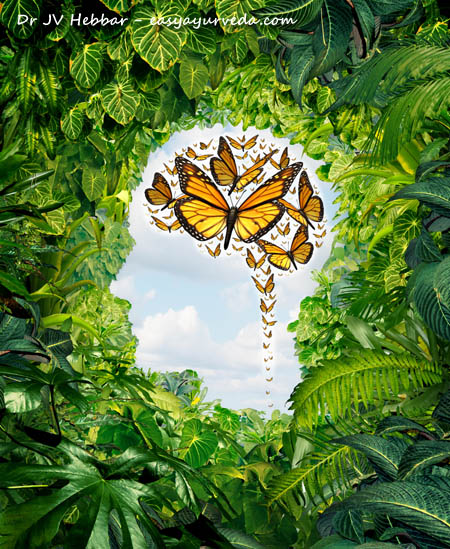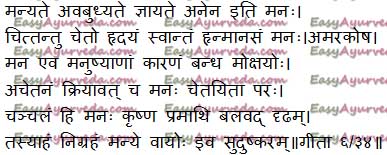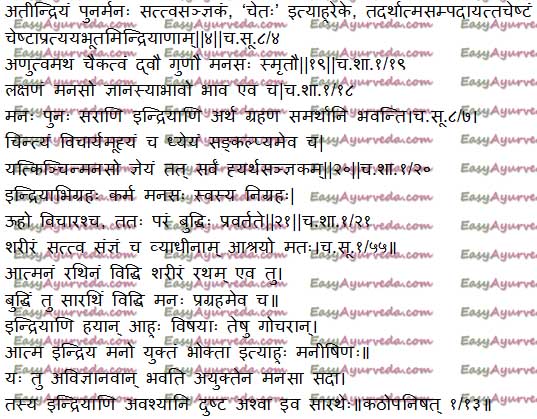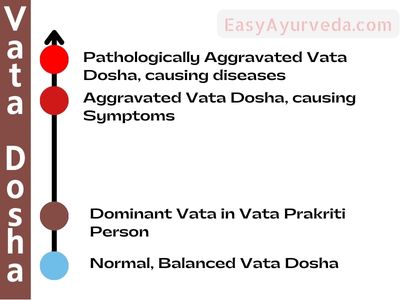Mind – Qualities, Functions, Doshas As Per Ayurveda

By Dr Raghuram Y.S. MD (Ay) & Dr Manasa, B.A.M.S
Mind is an important and inevitable component in the sequence of gaining knowledge. It is a bridge between the sense organs and the soul. When mind is diverted from the sense organs one doesn’t gain knowledge since the information is not passed on to the soul.
Mind is one of the abodes of disease. The mental diseases, in due course of time, afflict the body and also cause physical ailments, called the psycho-somatic disorders. Similarly, the mind is also the seat of health and happiness.
Table of Contents
Manas – the concept of mind in Ayurveda
Mind is a substance
According to Ayurveda, mind has its own qualities and actions and hence qualifies to be a substance.

Word derivation and meaning of the term manas
That which helps in knowing something is called manas.
That which helps in obtaining the knowledge of something is called mana.
That which has the capability to think is called mana or manas.
Synonyms of manas
- Chitta, Cheta, Hridaya
- Swanta, Hrit, Maanasa
- Mana, Sattva
Mind is inert
Though the mind is inert, it performs all the activities. The soul is said to be the stimulator and controller of the mind.

Mind as ubhayendriya i.e. dual organ
Mind is a dual organ i.e. it is both an organ of sense and action. It is also called as an extraordinary sense organ. In total, there are eleven
indriyas. They are –
Pancha Jnanendriyas – five sense organs
- Chakshurindriya – eye
- Ghranendriya – nose
- Shravanendriya – ear
- Rasanendriya – tongue
- Sparshanendriya – skin
Pancha Karmendriyas – five motor organs
- Vagindriya – speech apparatus
- Pani indriya – hands
- Pada indriya – feet
- Payu indriya – anus
- Upastha indriya – genitals
Ubhayendriya – that which is both a sense organ and an organ of action
The mind is an extraordinary sense and functional organ. Thus, mind is a dual organ.
Each sense organ or organs of action are related to their concerned objects. But the mind is related to the objects of all the sense and functional organs. A particular sense organ can perceive the knowledge of its object only when it is having connected with the mind i.e. when the mind is in contact with that sense organ.
The functions of the mind depend on the richness of the soul and its own subjects like happiness, grief etc. The mind is in turn responsible for all the functions of the indriyas i.e. sense organs.

Mind – Manas – sense organ
Mind as an atindriya, an extraordinary sense
The mind is called as an atindriya i.e. extraordinary sense. The word atindriya has two meanings. They are –
1. Indriya atikrantam / Indriya atikramana
- that which crosses the limitations and barriers of the senses or
- that which is very extraordinary when compared to the other sense organs
- that which is beyond and out of reach of the senses, having its own specific identity
2. Indriya atirikta
- that which has extraordinary sensory strength when compared to the other senses
- that which is an extra sense i.e. has a dual nature (already explained)
In Ayurveda, the sense organs are said to be made up of five elements of nature. But though the mind is also said to be an organ of sense and a dual sense, it is not considered to be made up of elements.
Each sense organ has its own and specific (single) object. Example, sound is the object of sense organ of hearing; touch that of skin etc. But the object of mind is not specific i.e. the mind not only perceives its objects i.e. thinking, guessing etc but also perceives the objects of all the sense organs. The sense organs are not capable of perceiving their subjects independently without the association of the mind. These instances prove the extraordinary nature of the mind i.e. indriya atikrantatva.
Mind is not only a sense organ but also an organ of action because it is associated with and useful to both the types of senses i.e. organs of sense and action i.e. ubhaya indriya prayojaka.
Therefore mind is an additional sense and is extraordinary since it possesses the qualities of both, organs of sense and action. Since the mind controls the activities of both (organs of sense and action) being associated (only when associated with them) with them and hence useful for both of them, it is considered as atirikta indriya i.e. an extra sense. Thus the atirikta indriyatva of the mind is proved.
Qualities of the mind – Oneness and Minuteness
The mind is only one, ekatva. But due to its association with many sense organs it appears to be many. But the fact is that the mind can be associated with only one sense organ at a time and not many. But the quickness with which the mind shifts from its association with one sense organ to the other makes it appear many. This quick shift of mind is only due to its minuteness, anutva. Oneness and minuteness are the qualities of the mind.
Signs and characteristic features of mind
Absence or presence of knowledge is the main characteristic feature and sign of presence of mind. Knowledge of anything is obtained only in the presence of an association between the sense objects, sense organs, mind and soul. Even when there is an association between the sense objects, sense organs and soul, if the mind is not present in the equation, one cannot obtain information or knowledge whereas the presence of mind in the equation, i.e. its association with other three entities makes gaining knowledge possible. (Charaka Samhita, Shareera Sthana, 1/18)
The senses can perceive their objects only in the presence of the mind i.e. when the senses are connected to the mind.
Subjects of the mind
- Chintya – thinking about many things
- Vicharya – analysing between good and bad
- Uhyam – making guess and inference
- Dhyeya – focusing on something with concentration of mind
- Sankalpam – determination and decision on the basis of discrimination made between good and bad
Apart from these, any other subject which falls into the territory of grasping and understanding to the mind, those which are fit to be understood by mind, i.e. happiness, grief, desire, hatred, rejection etc are all the subjects of the mind.
Functions of mind
इन्द्रियाभिग्रहः कर्म मनसः स्वस्य निग्रहः| ऊहो विचारश्च, ततः परं बुद्धिः प्रवर्तते||२१||
indriyābhigrahaḥ karma manasaḥ svasya nigrahaḥ|
ūho vicāraśca, tataḥ paraṃ buddhiḥ pravartate||21|
Charaka Samhita Shareera sthana 1/21
- Indriyabhigraha – to indulge the sense organs in their respective objects
- Swasya nigraha – to control self and keep detached from undesired subjects
- Uha – to understand out the meaning of subjects and treatises skill fully and understand their precise meaning
- Vichara – to have a thought process and reasoning about accepting or rejecting a thought
Following the functions of the mind, the intellect comes into action and the actions are taken accordingly, depending on what needs to be done and what not.
Seats of mind in the body
The mind and its subjects (mentioned above) are said to be located in the heart.
Mind as a seat for diseases
The body and mind are two seats for a disease to be manifested . The seat of mental disorders is mind. The mental disorders first manifest in the mind and later afflict the body.
Doshas of Mind
Raja and Tama, two among the three great qualities are said to be the contaminants of the mind. Sattva, the other one among the three great qualities, owing to its pureness is not considered as a contaminant.
Satva – is the supreme quality of mind. If some one is very spiritual, righteous, truthful, he is said to be a ‘Satvic’ person. So, being spiritual, righteous etc are because of Satva, which is the supreme quality of mind.
Best remedies for a mind disorder
The three basic principles of treating the mental disorders are –
- Dhee – proper and skilful use of the intellect
- Dhairya – seeding courage in one’s mind
- Atmadi Vijnanam – to make one to realise the importance of ‘self worth’
Mind is the controller
A reference from Kathopanishat tells –
The soul is a rider, the body is the chariot, the intellect is the charioteer and the mind is the rope which controls the horse. The sense organs are the horses and the sense objects are the pathways for those horses to move to and forth. The sense organs always benefit the soul associated with the mind. The sense organs of the person who is always devoid of knowledge, i.e. one who has thoughtless and non-discriminating intelligence and an uncontrolled mind, will become equivalent to mad and intoxicated horses of the charioteer.
Click to Consult Dr Raghuram Y.S. MD (Ayu) – Email / Skype
Addition by Dr Hebbar
Cause for disease of mind
In sense organs, if you under-utilize (like not seeing at all, not hearing at all) or over-utilize (like looking at very bright objects, hearing loud music,) or miss-utilize (like looking at sharp objects, hearing to weird music etc) causes sense organ disorders.
Similarly,
under-utilization of mind – not thinking, not reading, not engaging in knowledge etc.
Over-utilization of mind – excessive thinking, guessing, analyzing etc
Miss-utilization – thinking about unwanted, weird things etc. causes imbalance of Doshas of Manas (Rajas and Tamas) leading mental disorders.
How to maintain good mental health?
We have learnt that Satva is the supreme quality of mind. More the Satva, means, more the mind power and qualities. This also means, well balanced Raja and Tamas.
Hence, all efforts should be made to improve Satva. This can be achieved by adopting spiritual, noble, righteous lifestyle.
Read – Sadvritta In Ayurveda – Code Of Conduct For Healthy Life
Examples:
Brahmacharya – abstinence
Ethical behavior
Control over sense organs
Suppression of undesirable mental qualities (Dharaneeya Vega) (reference – Charaka Sutrasthana 7)-
Lobha – greed,
Shoka – grief,
Bhaya – fear,
Krodha – anger,
Mana – vanity,
Nairlajja – shamelessness,
Irshya – jealousy,
Atiraga – excessive desire
Abhidhyaya – ill will, malice
Avoiding Ari Shad Varga –
Kama – Lust,
Krodha – anger,
Lobha – greed,
Moha – delusion
Mada – ego
Matsara – jealousy
Proper amount of sleep, good amounts of healthy foods, Avoiding laziness and procrastination
Getting up early in the morning etc.
Spiritual practices, Yoga, pranayama, meditation – These are a few ways of empowering mind and maintaining good mental health.
Read related – Achara Rasayana – Behavioral Therapy For Calm Mind And Long Life
Manasik Guna Dosha
Q: According to yoga – that there were 3 gunas – satva, rajas and tamas. Caraka Samhita lists only 2 mental doshas: rajas and tamas. Why is it so?
A: Charaka explains Satva as the supreme quality of mind. And not as a Dosha.
If a person has more Satva, he will be more intelligent, spiritual etc. But because of Satva, person cannot get afflicted with disease.
This is not so, in case of Rajas and Tamas. If Rajas increases in a person, the person becomes more worldly and greedy.
If Tamas becomes more, he becomes lazy, sleepy and ignorant.
So, Rajas and Tamas are Doshas, similar to Vata, Pitta and Kapha. – When they are in normal state, they help mind to perform healthily. But when they are in excess, they cause disease. (the same is the case with Vata, Pitta and Kapha Dosha).
What is Satva? Prime quality of mind.
• Associated with truth, knowledge, courage, compassion, forgiveness, dedication and concentration
• Leads the person in the right path.
Rajas A Dosha of mind.
• Attraction, desire
• Drives the person to take action, to work, to make money.
• Anger and aggression are its by-product.
Tamas
• Dosha of Mind
• Darkness
• Inaction
• Lethargy
• Sleep
Journey to attain Moksha
• Through many births, the soul passes from Tamas to Rajas and then Rajas to Satva – purity.
Human being is the tripod of –
– body,
– mind and
– soul.
Mind and body are the abode of the
disease and their concordance is the
cause of health.
Mind – Manas “Manyate jnayate anena iti manah”
– Manana is applied to think, to imagine, to concentrate and to meditate.
“Chintyate jnayate anena iti chittam”
– to think, to ponder over, to reason, to discover.
“Satah bhavah sattvam”
– sat refers to existence, being, reality, truth.
Mind and knowledge gaining process:
Mind connects sense organs with intellect. This helps to passing of knowledge from sense organs to intellect and then to soul. This is how we gain knowledge. Read more – How knowledge is gained?
Mind cannot be perceived by sense organs. Mind can only be perceived by its actions.
Mind’s action is determined by the quality of Atma (soul), like desire, hatred, comfort, misery, intelligence and effort.
Though mind has its own actions, its qualities and actions are driven by the qualities of soul. The qualities of soul are decided by Karma, spiritual practice, good and bad deeds etc.
Vata and Mind
What is the relationship between Vata Dosha and mind?
Dr JV Hebbar
Vata Dosha is understood with its qualities like movement.
There are two end points in the Vata Dosha graph.
First point is – Vata Dosha is perfectly normal, healthy and balanced.
Second point is – It is Severely aggravated.

When Vata Dosha is normal, healthy and balanced, The nerve signal conduction, neuro hormone production and carriage, etc. all things associated with the brain and mind work normally.
When Vata Dosha is normal, the person has good memory, understanding capacity, retaining and recollecting capacities. His mind is calm. Anger, attraction, talkativeness, are normal. There are no confusions, anxiety, boredom, no excessive excitement, a very balanced reaction to mental stimulus.
Just from a few points from the balanced Vata Dosha, there is another slightly dominant Vata Dosha position. This is seen in people with Vata Dosha body type, also called Vata Prakriti.
In them, Vata is higher, naturally. This natural elevation of Vata Dosha makes them think a bit more, makes them talkative, more anxious, jealous than others, they make and lose friendships easily, they feel difficulty in taking decisions, over thinking, some of them even end up having a stealing mentality.
On a side note, very rarely that only Vata Dosha is naturally dominant in a person. In most of us, two Doshas are naturally dominant. So, we all tent to have a mixture of mental features.
The other end of scale, is a severely Vata Dosha aggravated condition. This can happen due to Vata increasing causative factors.
Here, Vata dosha is pathologically high. This leads to severe anxiety, anger, distrust, suspicion, jealousy, indecisions, lack of memory, excessive talkativeness, fear, grief, delusion, complaining attitude, etc.
So, what to do when these symptoms appear due to Vata Dosha increase?
One should adopt Vata Dosha balancing treatment, medicines and activities
Over and above this aggravated Vata Dosha, there actually lies a still higher stage, where Vata has turned so toxic that it causes severe diseases and in this pathological stage, Vata does not act normally at all.
For example, aggravated Vata Dosha makes one talk excessively, but a pathologically afflicted Vata person may have a condition called Vak Sanga – where he cannot talk at all.
To give a mental example, an aggravated Vata person will have anxiety, excessive thinking, fearfulness etc.
Pathologically afflicted Vata causes insanity (schizophrenia).
Read: Vata Disorders (Vatavyadhi): Definition, Causes, Symptoms









2 comments
Yajna
Sir,
Why vichara and uhya are mentioned in both karma and artha of manas?
Dr J V Hebbar MD(Ayu)Author
Chakshu indriya Artha is Roopa, but its function is Roopa Darshana – seeing the features of the object.
Similarly, Mano Indriya Artha is Chintya and Uhya – factors that are to be thought, analyzed and guessed. Its Karma is Uha, Vichara etc. – to think, analyze, guess etc.
Chintya is the object (Artha). Chintana is the process or Karma.